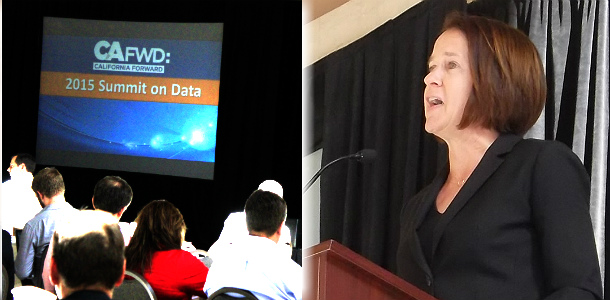
California is behind the times and needs to modernize its systems if the State wishes to improve accountability, accessibility, and transparency. That was the call-to-action by Jodi Remke, the new chair of the Fair Political Practices Commission (FPPC), as she addressed the audience at CA Fwd’s second annual Summit on Data.
Remke’s address to the summit was well received by the crowd of advocates, programmers, and government officials gathered to hear the latest trends, efforts, and ideas on the use of government data.
CA Fwd could not have agreed more with Remke, as she described the difficulty of providing timely and accurate information about spending in campaigns and lobbying. Under California law, Remke’s agency is tasked with enforcing the laws on money in politics, but the Secretary of State is charged with gathering all the data and disclosures from campaign committees and lobbying entities. The FPPC must rely on the Secretary’s oft-criticized disclosure system, Cal-Access, to obtain information for enforcement and public education efforts.
Remke described her agency’s frustration with old technology preventing the FPPC from meeting its potential:
California has strict campaign rules requiring candidates and elected officials to disclose almost every single donor of every single dollar given to their campaigns. It’s great; it’s one of the most comprehensive systems in the country. But all of this valuable disclosure is buried in a clunky state database that the average person doesn’t have any chance of finding or deciphering. We must have a new state database.
It’s this “clunky state database” (Cal-Access) that CA Fwd has committed to modernizing in order to improve public accountability statewide.
CA Fwd co-signed a request in 2013 to then-Secretary of State Debra Bowen to regularly release raw Cal-Access data online and end use antiquated use of CD-ROMs. The letter was also signed by partners in good government, data analysis, and the media. Bowen heard public outcry after initially denying the request but later relented and now makes the data disclosure available on the Secretary’s website. This has continued under new Secretary of State Alex Padilla.
In 2014, CA Fwd released a widely read report titled “Rebooting Campaign Finance Disclosure” which examined national best practices, challenges, and recommendations on how California can modernize Cal-Access and the disclosure of conflict of interest forms.
Later that year, CA Fwd again formed a coalition to support a financing plan to pay for the modernization of Cal-Access through the creative use of special funds and the state General Fund.
And this year, CA Fwd continues its advocacy by organizing the Cal-Access Working Group, consisting of media representatives, good government groups, lobbyists, campaign attorneys, local ethics commissions, vendors, and the FPPC as a technical advisor. The goal of the Cal-Access Working Group is to provide recommendations to Padilla on how he should move forward with the system.
Remke hit the bullseye on Cal-Access. The public is not served effectively as long as Cal-Access remains unchanged, and her commission will have difficulty fulfilling its mission. Efforts to upgrade the system has been a multi-year campaign that advocates hope will achieve more victories under the new Secretary of State. Until such time, CA Fwd considers the FPPC and Chair Remke as a partner in this effort to bring transparency and accountability into the 21st century.

